May 20, 2024
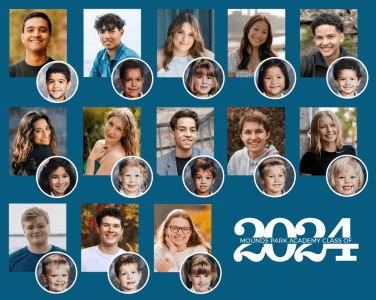 Near the end of their final year at MPA, we had the honor of interviewing many of the MPA Class of 2024 Lifers about their time at MPA, the only school they’ve been at for their entire academic career. A group of dedicated athletes, talented musical artists, Peer Leaders, and proud self-proclaimed robotics “nerds,” each of them shared memories and reflections of MPA past and present, looking toward the future well prepared by MPA. Devneet Biring, Jay Green, Greta Hanson, Sylvia Hawley, Micah Hudock, Khushi Jain, Else Kunze-Hoeg, Logan Miller, Ben Murr, Nora Pederson, Hunter Scheible, David Steinberger, and Molly Vergin will graduate on June 8 and join MPA’s Joanne Olson Club, reserved for students whose entire K-12 or PreK-12 journey has taken place here at MPA.
Near the end of their final year at MPA, we had the honor of interviewing many of the MPA Class of 2024 Lifers about their time at MPA, the only school they’ve been at for their entire academic career. A group of dedicated athletes, talented musical artists, Peer Leaders, and proud self-proclaimed robotics “nerds,” each of them shared memories and reflections of MPA past and present, looking toward the future well prepared by MPA. Devneet Biring, Jay Green, Greta Hanson, Sylvia Hawley, Micah Hudock, Khushi Jain, Else Kunze-Hoeg, Logan Miller, Ben Murr, Nora Pederson, Hunter Scheible, David Steinberger, and Molly Vergin will graduate on June 8 and join MPA’s Joanne Olson Club, reserved for students whose entire K-12 or PreK-12 journey has taken place here at MPA.
Choosing a school for 13 years means you’re growing up within a strong community that ensures every child here is known. So we asked: How has MPA’s community supported and shaped you over the years?
Jay: Everything I do pretty much revolves around sports, so what’s been really helpful for me is the community. If I’m in the hallway and I see a parent or a teacher, they always ask me how my game was, and that’s something that I really have enjoyed in my time here because it makes me feel seen. That was very consistent from even when I was in kindergarten, just playing in gym class versus now, when I play three sports at a time. That’s something that’s shaped me into a better person. I think now my focus is trying to give that same opportunity to the younger kids that I see and am coaching. I think the community does a very good job of supporting everyone in it. From my perspective, I feel like I’ve been very well-supported by pretty much everyone around me.
Khushi: I agree with that. Being both a tennis athlete and a nerd in robotics has pushed me to do more of what I love. Through tennis, I’ve learned more about myself, about mental health, and other things. Through robotics, I’ve learned how to be a leader, how to speak up, and how to get the team together. Through all these different clubs and activities that MPA has, I’ve learned different skills from each.
Micah: There are a lot of people who have a lot of different interests in a lot of areas. Everyone’s kind of encouraged to do their own thing and have their own interests, and no one is trying to fit into a category. Everyone’s cool to do whatever they want.
Ben: Elaborating on that, I’ve really enjoyed being able to know my class. To actually know people—having a small, very close-knit group—has really helped us understand each other on a deeper level than just, “There’s a person from my class in the hallway.” I find that nice.
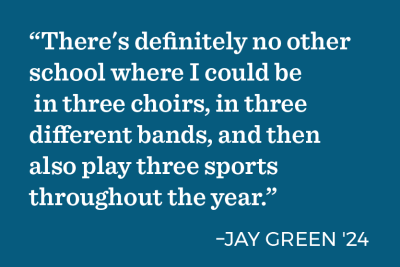 Nora: I like how integrated everybody is, whether in sports or other things. For example, in basketball, we did this kid’s camp with the boys’ and girls’ teams where we got to work with Lower and Middle School students, so now when I see them in the hallway I can say hi. And with different classes like choir and orchestra, you get to know people in all grades. With track, since it’s a co-ed sport, I get to talk and know people that I wouldn’t normally. It’s just interesting knowing more than one grade.
Nora: I like how integrated everybody is, whether in sports or other things. For example, in basketball, we did this kid’s camp with the boys’ and girls’ teams where we got to work with Lower and Middle School students, so now when I see them in the hallway I can say hi. And with different classes like choir and orchestra, you get to know people in all grades. With track, since it’s a co-ed sport, I get to talk and know people that I wouldn’t normally. It’s just interesting knowing more than one grade.
Sylvia: The relationships we’re able to build are pretty unique to this school because of the small class sizes. Throughout all my years here, I think all the teachers really make an effort to build a relationship outside of the classroom, to know you on a more personal level. That has allowed me to feel comfortable sharing non-class material with them and getting to know them as people. I think that has shaped my love for learning but also made me want to do more. Read More
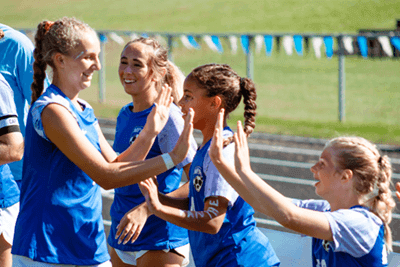 This message is from MPA’s Office of Admission from the October 2 issue of Inside MPA. Click here to get in touch with Admission and learn more!
This message is from MPA’s Office of Admission from the October 2 issue of Inside MPA. Click here to get in touch with Admission and learn more!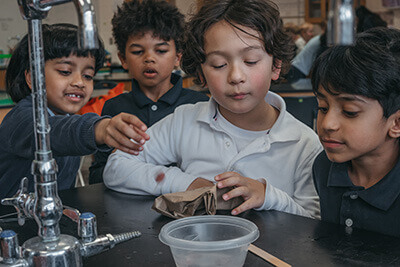 This message is from MPA’s Office of Admission from the September 21 issue of Inside MPA.
This message is from MPA’s Office of Admission from the September 21 issue of Inside MPA. 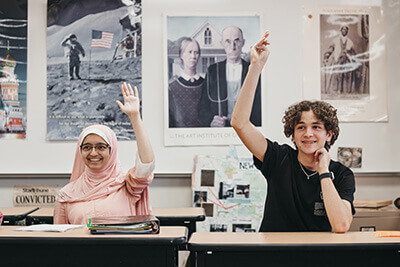 A liberal arts education is one of the many benefits of a private school. But looking deeper, the philosophy behind it reveals why a liberal arts education is so important in our technology-driven world. Education is more dynamic and multifaceted than ever, responding to the demands of a rapidly evolving global landscape. Amidst this transformation, the advantage of liberal arts education stands out as both timeless and increasingly relevant. Traditionally associated with studying subjects such as humanities, literature, philosophy, history, and the arts, liberal arts education emphasizes a broad-based approach to learning that fosters critical thinking, effective communication, and ethical reasoning.
A liberal arts education is one of the many benefits of a private school. But looking deeper, the philosophy behind it reveals why a liberal arts education is so important in our technology-driven world. Education is more dynamic and multifaceted than ever, responding to the demands of a rapidly evolving global landscape. Amidst this transformation, the advantage of liberal arts education stands out as both timeless and increasingly relevant. Traditionally associated with studying subjects such as humanities, literature, philosophy, history, and the arts, liberal arts education emphasizes a broad-based approach to learning that fosters critical thinking, effective communication, and ethical reasoning.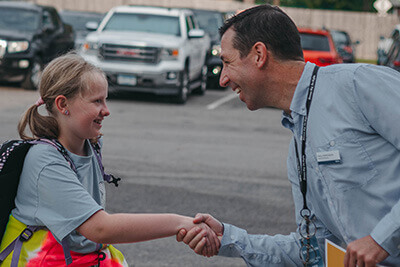 This message is from MPA’s Office of Admission from the August 27, 2024 issue of InsideMPA.
This message is from MPA’s Office of Admission from the August 27, 2024 issue of InsideMPA.  Parents of Lifers are those who chose MPA for their children every year for all 13 years of their education. Right before they graduated from MPA,
Parents of Lifers are those who chose MPA for their children every year for all 13 years of their education. Right before they graduated from MPA,  Kristi (Jay ’24): The opportunities he’s had across the board. I don’t think he would’ve been in a school play if he was at a different school. And selfishly, I already knew that there were outstanding teachers here–some of them that I had!–so I knew from the get-go what he was getting into and how it was going to help him flourish in school, because I feel like that’s a huge piece too–knowing how supportive and invested all these outstanding teachers are.
Kristi (Jay ’24): The opportunities he’s had across the board. I don’t think he would’ve been in a school play if he was at a different school. And selfishly, I already knew that there were outstanding teachers here–some of them that I had!–so I knew from the get-go what he was getting into and how it was going to help him flourish in school, because I feel like that’s a huge piece too–knowing how supportive and invested all these outstanding teachers are.  Near the end of their final year at MPA, we had the honor of interviewing many of the MPA Class of 2024 Lifers about their time at MPA, the only school they’ve been at for their entire academic career. A group of dedicated athletes, talented musical artists, Peer Leaders, and proud self-proclaimed robotics “nerds,” each of them shared memories and reflections of MPA past and present, looking toward the future well prepared by MPA. Devneet Biring, Jay Green, Greta Hanson, Sylvia Hawley, Micah Hudock, Khushi Jain, Else Kunze-Hoeg, Logan Miller, Ben Murr, Nora Pederson, Hunter Scheible, David Steinberger, and Molly Vergin will graduate on June 8 and join MPA’s Joanne Olson Club, reserved for students whose entire K-12 or PreK-12 journey has taken place here at MPA.
Near the end of their final year at MPA, we had the honor of interviewing many of the MPA Class of 2024 Lifers about their time at MPA, the only school they’ve been at for their entire academic career. A group of dedicated athletes, talented musical artists, Peer Leaders, and proud self-proclaimed robotics “nerds,” each of them shared memories and reflections of MPA past and present, looking toward the future well prepared by MPA. Devneet Biring, Jay Green, Greta Hanson, Sylvia Hawley, Micah Hudock, Khushi Jain, Else Kunze-Hoeg, Logan Miller, Ben Murr, Nora Pederson, Hunter Scheible, David Steinberger, and Molly Vergin will graduate on June 8 and join MPA’s Joanne Olson Club, reserved for students whose entire K-12 or PreK-12 journey has taken place here at MPA. Nora: I like how integrated everybody is, whether in sports or other things. For example, in basketball, we did this kid’s camp with the boys’ and girls’ teams where we got to work with Lower and Middle School students, so now when I see them in the hallway I can say hi. And with different classes like choir and orchestra, you get to know people in all grades. With track, since it’s a co-ed sport, I get to talk and know people that I wouldn’t normally. It’s just interesting knowing more than one grade.
Nora: I like how integrated everybody is, whether in sports or other things. For example, in basketball, we did this kid’s camp with the boys’ and girls’ teams where we got to work with Lower and Middle School students, so now when I see them in the hallway I can say hi. And with different classes like choir and orchestra, you get to know people in all grades. With track, since it’s a co-ed sport, I get to talk and know people that I wouldn’t normally. It’s just interesting knowing more than one grade.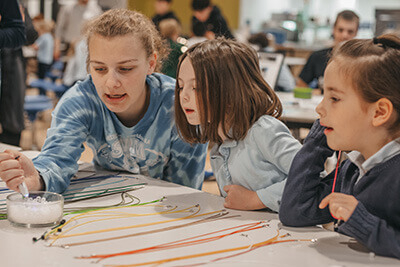 This message is from MPA’s Office of Admission from the April 11, 2024 issue of InsideMPA.
This message is from MPA’s Office of Admission from the April 11, 2024 issue of InsideMPA. 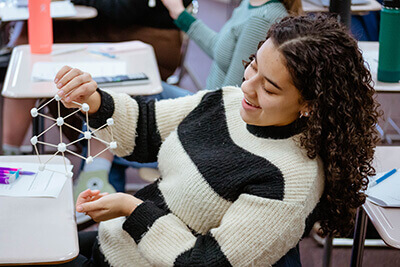 from Jennifer Rogers-Petitt, director of development and community engagement
from Jennifer Rogers-Petitt, director of development and community engagement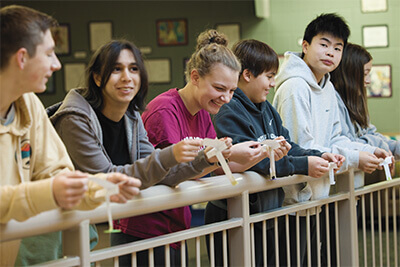 The arrival of spring brings a new season to all private schools all around the country–admission season! Here at MPA, decisions are released on March 29 and the enrollment deadline quickly follows on April 12. This means families are currently facing a decision, and sometimes that decision can be difficult. So with the help of our community, we collected a list of ten things families should consider when deciding on a private school.
The arrival of spring brings a new season to all private schools all around the country–admission season! Here at MPA, decisions are released on March 29 and the enrollment deadline quickly follows on April 12. This means families are currently facing a decision, and sometimes that decision can be difficult. So with the help of our community, we collected a list of ten things families should consider when deciding on a private school.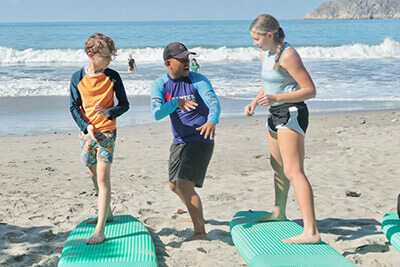 This message is from MPA’s Office of Admission from the March 10, 2024 issue of InsideMPA. Click here to get in touch with Admission and learn more!
This message is from MPA’s Office of Admission from the March 10, 2024 issue of InsideMPA. Click here to get in touch with Admission and learn more!